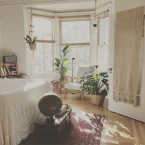The Real Cost of Clutter: How to Transform Your Home and Your Life

Introduction: Why clutter is a problem
Have you ever felt overwhelmed by the amount of stuff in your home? Have you found yourself struggling to stay organized and keep your space tidy? You’re not alone. The rise of clutter in American homes has become a growing problem in recent years, and it’s affecting our physical and mental well-being.
According to the Self Storage Association, one in 10 households rents a storage unit because their homes can no longer accommodate all of their possessions. The average American home size has nearly doubled in the last 50 years, and with it, the need for more storage space. We now have three and four car garages, storage rooms and bonus rooms, walk-in closets and walk-in pantries, home offices and home theaters. All this space, and still not enough room to hold all of our possessions.
The acquisition of our clutter comes from two categories: situational clutter and self-imposed clutter. Situational clutter occurs when a life event or situation inundates us with clutter in our once organized space. For example, our adult child returns home, bringing all of their possessions in tow. The death of a loved one, a move, an illness, a major disruption in our normal routine creates disorder and disorganization, and clutter usually follows it.
Self-imposed clutter is a little broader in scope and revolves around decisions that we make or choose not to make. We create clutter when we keep an excess of sentimental items, those items that might be difficult to part with, or when we indulge in shopping sprees without much thought to the necessity of our purchases. This category also includes the value mindset, where we become so focused on the original price that we paid for an item, the idea of letting go of that item in our mind is equal to throwing away money, so we keep it even if we don’t need it or use it.
In the following sections, we’ll explore the physical, mental, and emotional impact of clutter on our lives and how we can start to tackle this problem. Clutter may seem like a small issue, but it can have a big impact on our overall well-being. Let’s take a closer look.
Situational clutter and how it affects our homes
Situational clutter is a type of clutter that occurs when our once organized space becomes inundated with possessions due to a life event or situation. This category of clutter can be difficult to prevent, but it’s important to understand how it affects our homes and how we can deal with it.
One common example of situational clutter is when our adult child returns home and brings all of their possessions in tow. Suddenly, a once organized space becomes crowded and disorganized. The death of a loved one, a move, an illness, or a major disruption in our normal routine can also create disorder and disorganization, leading to clutter.
Situational clutter can make it difficult to navigate through our homes and find the things we need. It can also make it difficult to maintain our homes, as clutter can accumulate quickly and be difficult to get rid of. Situational clutter can cause stress, anxiety, and even embarrassment, especially when we have guests over.
To deal with situational clutter, it’s important to take a step back and assess the situation. If you’re dealing with clutter due to a life event, such as a move or a death in the family, take some time to process your emotions and deal with any underlying issues. This can help you approach the clutter with a clear mind and make it easier to let go of things you no longer need.
Another strategy for dealing with situational clutter is to break it down into smaller tasks. Don’t try to tackle everything at once, as this can be overwhelming. Instead, focus on one room or area at a time, and be methodical about sorting through your possessions. Decide what you need to keep, what you can donate or sell, and what can be thrown away.
Self-imposed clutter: shopping and sentimental items
Self-imposed clutter is clutter that we create ourselves through our own decisions. This can include shopping sprees without much thought to the necessity of our purchases or holding on to sentimental items that we no longer need.
Shopping can be a major source of self-imposed clutter. Today, it’s so easy to make a purchase with very little thought to the necessity of that purchase. We shop for the thrill of saving money using coupons, returning to the store the next week with cashback incentives, and it’s hard to pass up a buy one, get one offer. But do we really need these items, or are we simply motivated to buy because we’re getting a good deal?
Another source of self-imposed clutter is sentimental items. These are items that may be difficult to part with, such as family heirlooms or items that hold special memories. While it’s important to honor these items, holding on to too many sentimental items can lead to clutter and disorganization. It’s important to be selective about what we keep and to find ways to display or use these items so that they are not just taking up space.
To prevent self-imposed clutter, it’s important to be mindful about our purchases and to only buy what we need or truly want. It’s also important to find ways to honor sentimental items without holding on to too many. This can include taking photographs of items or finding creative ways to display them.
The value mindset and its role in clutter
The value mindset is another source of self-imposed clutter. This is when we become so focused on the original price that we paid for an item that the idea of letting go of that item in our mind is equal to throwing away money. This can lead to holding on to items that we no longer need or use, simply because we believe they are valuable.
To prevent the value mindset from contributing to clutter, it’s important to focus on
The physical and mental toll of clutter on our well-being
Clutter not only affects the physical appearance of our homes, but it can also have a significant impact on our well-being. Living in a cluttered environment can lead to physical and mental fatigue, stress, and negative emotions.
When we surround ourselves with excess clutter, it competes for our attention, making it difficult to maintain focus and be productive. The visual distraction of clutter also makes it difficult to relax and be in the present moment. This constant mental stimulation can lead to increased stress and anxiety.
Consistent long-term stress impacts our eating, sleeping, and exercise habits, which can ultimately lead to physical health problems. Additionally, our clutter can bring on feelings of embarrassment and guilt, which can impact our self-worth and our relationships with others.
The emotional impact of clutter on our relationships
Clutter can also have a negative impact on our relationships. We don’t feel good about having people come to our home, which can impact our social life and our ability to entertain guests. It can also cause tension and conflict with family members and partners who may have different tolerance levels for clutter.
In some cases, clutter can even lead to isolation and social withdrawal. People may avoid having guests over or going out in public because they feel embarrassed about their cluttered home. This can have a significant impact on mental health and overall well-being.
The financial cost of clutter
Clutter also comes with a financial cost. We spend money on shopping, organizing, maintaining, repairing, replacing, and searching for items. The more possessions we have, the more time and money we spend on these activities.
Additionally, clutter can impact our ability to make money. If our cluttered home is affecting our work productivity, we may miss out on opportunities for career advancement or even lose our jobs. It can also prevent us from selling our homes or cars for their full value if they are cluttered and unappealing to potential buyers.
In conclusion, clutter not only affects the physical appearance of our homes but also has a significant impact on our well-being, relationships, and finances. It’s important to take steps to declutter and create a more organized and peaceful environment. This can include breaking down clutter into smaller tasks, being mindful about our purchases, and finding ways to honor sentimental items without holding on to too many. By doing so, we can improve our physical and mental health, enhance our relationships, and save time and money in the long run.
How to get started decluttering
Decluttering can seem overwhelming, but it’s important to remember that it’s a process that takes time and effort. Here are some tips for getting started:
Make time to make decisions
Set aside dedicated time to go through your possessions and make decisions about what to keep, donate, or discard. Start with easy decisions and get comfortable with the process of letting go. Work in short blocks of time, two to four hours a day, rather than 12-hour days on the weekends. Celebrate each decision that you make, no matter how small, because each decision is a step towards releasing the burden of your clutter.
Recruit a friend or hire a professional organizer
For harder decisions or if you’re feeling stuck, recruit a friend or hire a professional organizer to support you. A fresh perspective can help you make tough decisions and stay motivated.
Consider the one-in, one-out rule
To maintain a clutter-free home, consider adopting the one-in, one-out rule. When you buy or are gifted an item, release an item from that same category, maintaining a status quo of what you own.
Donate and do so often
If you’re struggling to make space in your home, remember that someone, somewhere could make use of what you have and are not using. Donate items that are in good condition and do so often. This not only helps others but can also give you a sense of satisfaction and freedom.
Tips for maintaining a clutter-free home
Decluttering is one thing, but maintaining a clutter-free home is another. Here are some tips for staying organized:
Create designated spaces for everything
Assign a specific place for each item in your home, and make sure to return it to that place when you’re done using it. This not only keeps your home organized but also saves time and reduces stress when you need to find something.
Regularly assess your possessions
Regularly assess your possessions and be mindful of what you bring into your home. When shopping, ask yourself if you really need the item and where you will put it when you bring it home.
Stay on top of maintenance
Regularly clean and maintain your home, including your storage areas. This prevents clutter from accumulating and makes it easier to stay organized.
The transformational power of letting go of excess clutter
Letting go of excess clutter can be a transformational experience. It can lead to improved mood, mindset, and overall health. Here are some benefits of decluttering:
Improved mental health
Living in a cluttered environment can lead to stress and anxiety, while decluttering can improve mental clarity and reduce stress levels.
Better physical health
Decluttering can also lead to better physical health, as it creates a cleaner, healthier living environment. Additionally, it can encourage healthy habits, such as exercise and healthy eating.
Enhanced relationships
Decluttering can also improve relationships with family and friends. A cleaner, organized home can make it easier to entertain guests and can lead to more positive interactions with loved ones.
In conclusion, decluttering is a process that takes time and effort, but the benefits are worth it. By getting started and maintaining a clutter-free home, you can improve your physical and mental health, enhance your relationships, and create a more organized and peaceful living environment.
Conclusion
Clutter can have a significant impact on our physical, mental, and emotional well-being. From the rise of clutter in American homes to the two categories of clutter acquisition, it’s clear that many of us struggle with excess possessions. Situational and self-imposed clutter can both contribute to a cluttered home, while the value mindset can make it difficult to let go of items we no longer need.
The physical and mental toll of clutter can be significant, including stress, distraction, and wasted time and money. Clutter can also impact our relationships with others and lead to feelings of guilt and embarrassment. However, by taking steps to declutter and maintain a clutter-free home, we can experience a transformational shift in our well-being.
To get started with decluttering, it’s important to make time to make decisions and consider recruiting a friend or professional organizer for support. Maintaining a clutter-free home involves creating designated spaces for everything, regularly assessing possessions, and staying on top of maintenance. The benefits of decluttering include improved mental and physical health, enhanced relationships, and a more organized and peaceful living environment.
In the end, the real cost of clutter is much greater than the physical possessions we accumulate. It’s the toll it takes on our well-being, our relationships, and our overall quality of life. By taking steps to declutter and let go of excess possessions, we can experience the transformational power of living with less and enjoying more.













